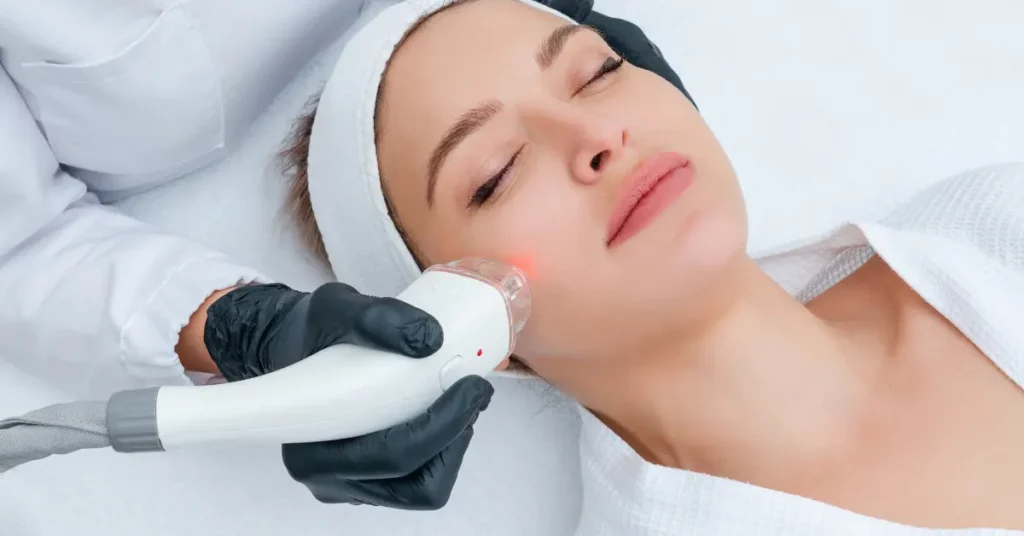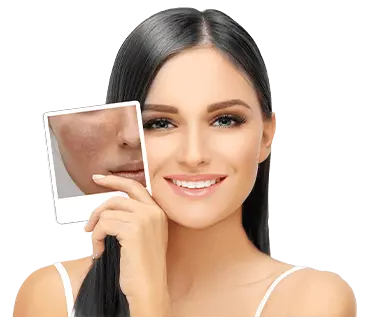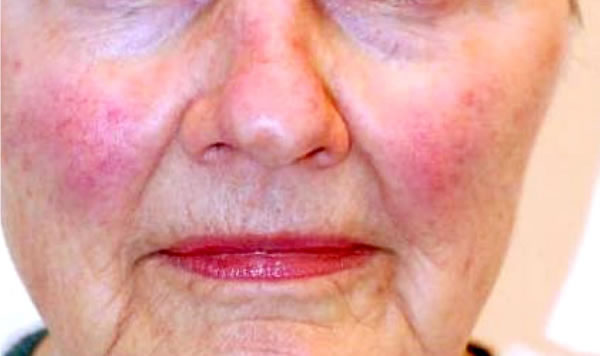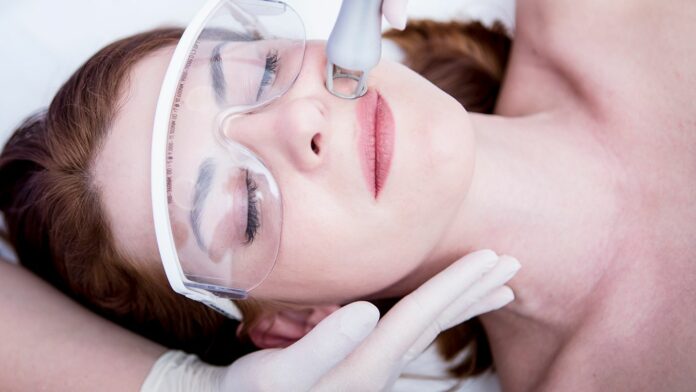As technology advances, so do our skincare solutions. Laser skin treatments have seen a surge in popularity over the years due to their precision and effectiveness in treating various skin conditions. They offer a non-invasive approach to improve skin texture, treat hyperpigmentation, reduce signs of aging, and more, hence gaining widespread acceptance. By harnessing the power of laser technology, dermatologists can target specific skin issues with minimal downtime. This increasing demand for aesthetic procedures, coupled with the desire for youthful and flawless skin, propels the growth of the laser skin treatment market. This article will delve into everything you need to know about these high-tech treatments.
How Lasers Work on Skin?
Lasers, an acronym for Light Amplification by Stimulated Emission of Radiation, work by emitting a specific wavelength of light that targets different skin issues. Their unique aspect lies in their ability to selectively heat or destroy specific targets without affecting surrounding tissues. For instance, some lasers target the melanin in hair follicles for laser hair removal, while others target water in the skin to stimulate collagen production, addressing wrinkles and skin laxity. The laser’s intensity, pulse duration, and wavelength can be adjusted depending on the skin condition being treated, ensuring precise, controlled, and customized treatments for each individual’s needs.
Types of Laser Treatments
- Fractional Laser Skin Resurfacing: Fractional lasers create microscopic holes in the skin to stimulate the body’s healing response and increase collagen production. They’re effective for reducing the appearance of wrinkles, acne scars, and sun damage.
- Carbon Dioxide (CO2) Lasers: CO2 lasers have been used for many years to treat different skin issues, including wrinkles, scars, warts, and other conditions. They are known for their precision, allowing for targeted treatment.
- Erbium Laser Resurfacing: Erbium lasers can remove thinner layers of skin than CO2 lasers, and they’re especially good for treating age spots, fine lines, and wrinkles on the face, neck, chest, and hands.
- Pulsed-Dye Lasers (PDL): PDLs are used to treat vascular lesions such as broken capillaries, rosacea, and red birthmarks. They work by heating and destroying blood vessels, which the body then naturally eliminates.
- Intense Pulsed Light (IPL): While not a traditional laser, IPL works similarly by emitting light energy that is absorbed by various components of the skin. It is used for skin rejuvenation, pigment correction, and hair removal.
- Q-Switched Lasers: These lasers deliver high power in short bursts, making them ideal for tattoo removal. They work by breaking up the tattoo pigment, which the body then naturally removes.
- Nd:YAG Laser: This laser is versatile and can be used for a variety of skin concerns, including hair removal on darker skin tones, tattoo removal, and treating vascular lesions.
- Alexandrite Laser: This laser is commonly used for hair removal, treating pigmented lesions, and tattoo removal. It’s particularly effective for individuals with lighter skin tones.
- Diode Lasers: Diode lasers are often used for hair removal and treating vascular lesions. They can penetrate deeper into the skin, allowing for effective treatment of thicker hair and deeper blood vessels.
- Thulium Lasers: Thulium lasers are ideal for skin resurfacing and treating pigmentation issues, especially on the face and neck areas.
Each type of laser treatment has its unique benefits and is suited to different skin types and conditions. Always consult with a dermatologist or trained professional to determine the most appropriate laser treatment for your skin needs.
Benefits of Laser Skin Treatments

- Versatility: One of the key advantages of laser skin treatments is their versatility. They can address a broad range of skin issues, from wrinkles to pigmentation disorders, acne scars, hair removal, tattoo removal, and vascular lesions. Different types of lasers cater to different needs, allowing for personalized treatments.
- Precision and Control: Laser treatments offer exceptional precision, targeting only the problem areas and leaving the surrounding skin unharmed. This level of control reduces the risk of side effects and facilitates quicker recovery.
- Stimulation of Natural Skin Processes: Many laser treatments work by stimulating the body’s natural processes. For instance, lasers used in resurfacing treatments promote collagen production, which is vital for skin elasticity and firmness. This leads to a more youthful appearance and enhances the skin’s natural healing abilities.
- Minimally Invasive: Unlike surgical procedures, laser treatments are generally minimally invasive. They can achieve significant results without the need for incisions or extensive downtime. This makes them an appealing option for those who prefer less invasive cosmetic treatments.
- Fast and Effective: Laser treatments often deliver quicker results compared to other skincare treatments. Some laser treatments show visible improvements after just one session, although multiple sessions may be required for optimal results. Additionally, the actual treatment time is usually quick, often completed in under an hour.
- Long-lasting Results: Although results can vary depending on the specific treatment and individual’s skin, laser treatments tend to offer long-lasting results. For example, in hair removal, lasers can reduce hair growth for months to years. When it comes to skin rejuvenation, the increased collagen production can continue to improve skin appearance for months after the treatment.
The benefits of laser skin treatments are plentiful. However, as with any cosmetic procedure, it’s essential to consult with a certified professional to understand the potential risks and to ensure that the treatment is appropriate for your specific skin concerns and type.
Treating Hyperpigmentation

- Understanding Hyperpigmentation: Hyperpigmentation refers to the darkening of the skin due to an excess of melanin, the pigment that determines skin color. It can be caused by sun damage, inflammation, or other skin injuries, including those related to acne.
- Laser Treatments for Hyperpigmentation: Laser treatments, such as Q-switched lasers and IPL therapy, target melanin in the skin to treat hyperpigmentation effectively.
- Process: These lasers emit light that is absorbed by the pigmented skin cells. The heat destroys these cells, allowing the body to naturally eliminate them.
- Effectiveness: Laser treatments can lighten dark spots and even out skin tone. However, results may vary and multiple sessions might be required for the best outcomes.
- Aftercare: Post-treatment, it’s essential to protect the skin from sun exposure as it can exacerbate pigmentation.
- Professional Consultation: As with any skincare procedure, it’s best to consult with a dermatologist to evaluate if laser treatment is suitable for your specific condition.
Laser Treatments for Acne and Acne Scars
- Understanding Acne and Acne Scars: Acne and acne scars result from inflamed blemishes caused by skin pores engorged with excess oil, dead skin cells, and bacteria. Acne scars are the result of inflamed lesions.
- Laser Treatments for Acne: Laser therapy can reduce acne by targeting the oil-producing sebaceous glands in your skin, making them less active. It can also kill the bacteria that causes acne inflammation.
- Laser Treatments for Acne Scars: Laser resurfacing can improve the appearance of acne scars by stimulating collagen production, promoting new skin growth, and reducing inflammation.
- Procedure: Depending on the type and severity of acne or acne scars, various laser treatments, such as Fraxel, IPL, or CO2 lasers, may be used.
- Effectiveness and Safety: Although these treatments can be highly effective, potential side effects like temporary skin redness or sensitivity should be discussed with a professional.
- Consultation: It is crucial to consult with a dermatologist or a certified laser technician before opting for any laser treatment to understand its benefits, risks, and suitability for your specific skin condition.
Related: Best Skincare Routine for Acne-Prone skin.
Post-Treatment Care:
- Immediate Aftercare: Right after laser treatment, your skin might be red and irritated. Applying a cold compress can provide immediate relief.
- Hydration is Key: Keep your skin well-hydrated by drinking plenty of water and using a high-quality, fragrance-free moisturizer.
- Sun Protection: Sun exposure can cause skin damage and compromise your results. Protect your skin with a broad-spectrum sunscreen of at least SPF 30, and wear a hat when outdoors.
- Gentle Skincare: Avoid exfoliating or using harsh products on your skin for at least a week post-treatment.
- Follow-Up Visits: Schedule follow-up visits with your healthcare provider to assess your progress and discuss any concerns.
- Healthy Lifestyle: Maintain a healthy lifestyle, including a balanced diet and regular exercise, to support your skin’s healing process and promote long-lasting results.
Risks and Side Effects

- Redness and Irritation: Post-treatment, patients may experience skin redness, irritation, and a sensation similar to sunburn.
- Pigment Changes: Laser treatments can sometimes lead to temporary or permanent changes in skin color, especially in people with darker skin.
- Swelling: Treated areas can show signs of swelling, usually a temporary side effect that subsides after a few days.
- Infections: Though rare, improper aftercare could lead to bacterial, viral, or fungal infections.
- Scarring and Burns: If not administered properly, lasers can potentially cause scarring and burns, underscoring the importance of choosing a skilled provider.
- Allergic Reactions: There may be allergic responses to topical products used during the procedure.
- Rare Side Effects: More rare side effects could include blistering and activation of cold sores.
Conclusion
Laser skin treatments offer a promising solution to numerous skin concerns, from aging signs to pigmentation issues. However, they’re not a one-size-fits-all remedy. The efficacy and suitability of these treatments can vary based on skin type, condition severity, and individual health factors. Potential side effects, albeit rare, should also be thoroughly considered. It’s paramount to consult with a certified dermatologist or skin care professional to understand whether laser skin treatments are the right choice for your specific needs. Remember, while advancements in skin care technology can help enhance our physical appearance, embracing our unique beauty is the real key to confidence.


